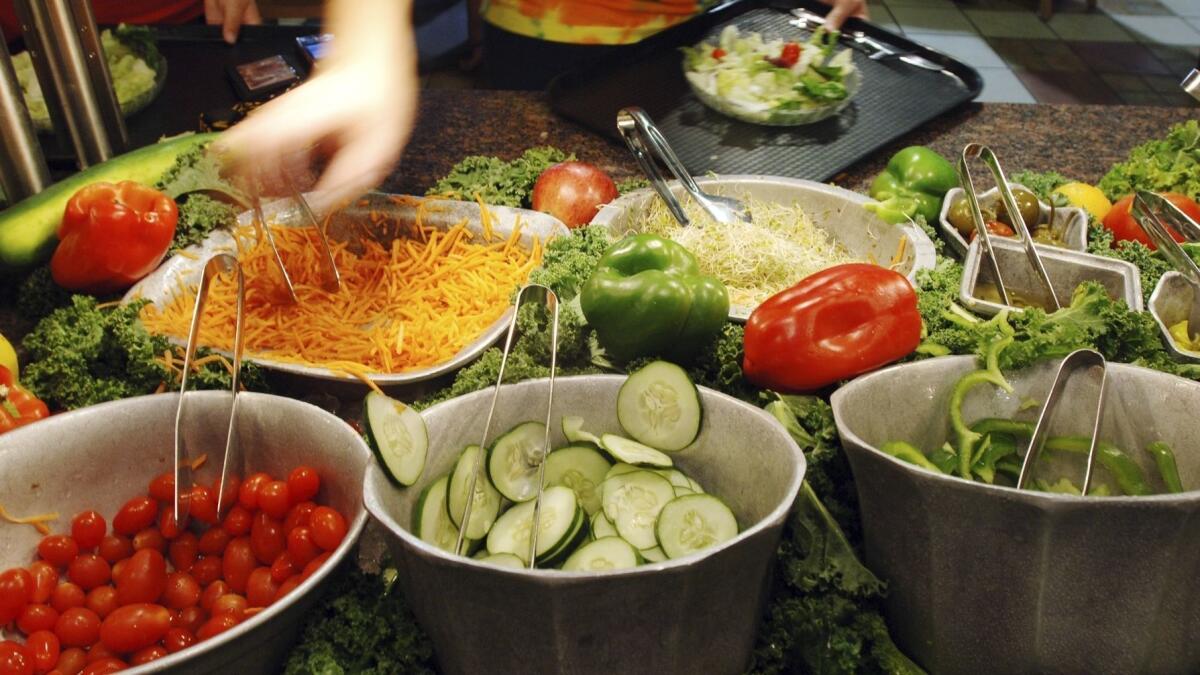Your sustainable diet for the year 2050: More nuts, less sugar and red meat

Good news, Earthlings! An international team of scientists reports that it is indeed possible to feed everyone on the planet a healthy and environmentally sustainable diet by the year 2050.
All it will take is a wholesale, radical change to what foods we eat and the way we produce them.
“We call it the Great Food Transformation,” said Jessica Fanzo, director of the Global Food Ethics and Policy Program at Johns Hopkins University in Maryland. “While that may sound dramatic, we need big transformation and massive cooperation to meet this global challenge.”
In a report published Wednesday in Lancet, Fanzo, along with 36 colleagues from 16 countries, released a set of scientifically determined targets to guide food producers, food consumers and policymakers toward creating a food system that will improve human health and the health of the planet.
The proposed diet, based on a two-year review of hundreds of nutrition studies, is not as scary as one might think. Insects are not required eating. No one is asking anyone to become a vegan.
The reference diet includes 2,500 calories per day, which is close to the global average today of 2,370.
In the U.S., men consume 2,800 calories per day while women consume between 2,000 and 2,200, according to the report.
The authors say that red meat can still be on a globally sustainable menu but in drastically reduced quantities. The diet allows for roughly 1 tablespoon of red meat per day. That’s the equivalent of one decent-sized hamburger a week, or one steak a month.
Dairy is not off the table, either. The target diet includes up to one glass of milk or other dairy product per day.
For other protein sources, the researchers recommend roughly two servings of fish per week, and 1½ eggs per week. The majority of calories on this diet comes from grains, as they do today, but the authors emphasize that we need to shift to whole grains.
They also want to see a 100% increase in the amount of legumes, nuts and fruits and vegetables most of us consume and for added sugars to become just 5% of our total caloric intake. That means no more than 8 teaspoons per day.
“It is very consistent with many traditional diets including the Mediterranean diet,” said Dr. Walter Willett, professor of epidemiology and nutrition at the Harvard T.H. Chan School of Public Health, who co-chaired the report. “This is not radical at all in many culinary traditions.”
It would also lead to global improvements in human health. If everyone on the planet adopted these dietary rules, 11 million premature deaths would be avoided each year, he said.
In order to keep this diet sustainable as the world’s population grows, the authors set goals for how our food is produced as well.
These include a drastic reduction in greenhouse gas emissions associated with food production from 8.5 to 13.7 gigatons today to about 5 gigatons by 2050.
Environmental targets also require a 50% reduction in food waste and a strict zero expansion of farmland. Sustainable food production will also require big changes in irrigation and fertilizer use, the authors said.
Of the 7.6 billion people on Earth today, nearly 1 billion don’t have enough food, 2 billion are overweight or obese and another 2 billion don’t get enough nutrients, the authors wrote. In addition, unhealthy diets are responsible for more deaths than unsafe sex, drugs, alcohol and tobacco use combined.
Environmentally, global food production is currently responsible for 30% of global greenhouse-gas emissions and 70% of freshwater use, the authors said. Meanwhile, the conversion of natural ecosystems to farmland is the No. 1 driver of extinction.
Considering that the world is expected to have a population of 9.8 billion people by 2050, it is clear that a massive change is needed, the authors said.
“It’s a win-win,” said Johan Rockström, professor of environmental science at Stockholm University, who worked on the study. “Adopting a healthy diet helps us deal with the climate and meet sustainable development goals.”
However, not everyone agrees with this assessment.
“The Lancet report is many things, but it is not a consensus report,” said Frank Mitloehner, who studies livestock emissions at UC Davis.
He agrees that food systems will need to be transformed if we hope to feed nearly 10 billion people by 2050, but he thinks reducing food waste is more important than dictating what people should eat.
In the U.S., Mitloehner said, 50% of all fruits and vegetables go to waste, as do 20% of animal-based foods such as meat, dairy and eggs.
The diet laid out in the report “will not decrease our food waste, it will increase our food waste,” he said.
The National Cattlemen’s Beef Assn. shared Mitloehner’s skepticism.
“The biggest opportunity for a healthy sustainable diet will come from reducing food waste, eating fewer empty calories and enjoying more balanced meals,” the trade group said in a statement.
Representatives of the California Farm Bureau Federation and the Western U.S. Agricultural Trade Assn. declined to comment on the study. The U.S. Department of Agriculture did not return a call seeking comment.
Do you love science? I do! Follow me @DeborahNetburn and “like” Los Angeles Times Science & Health on Facebook.
MORE IN SCIENCE







